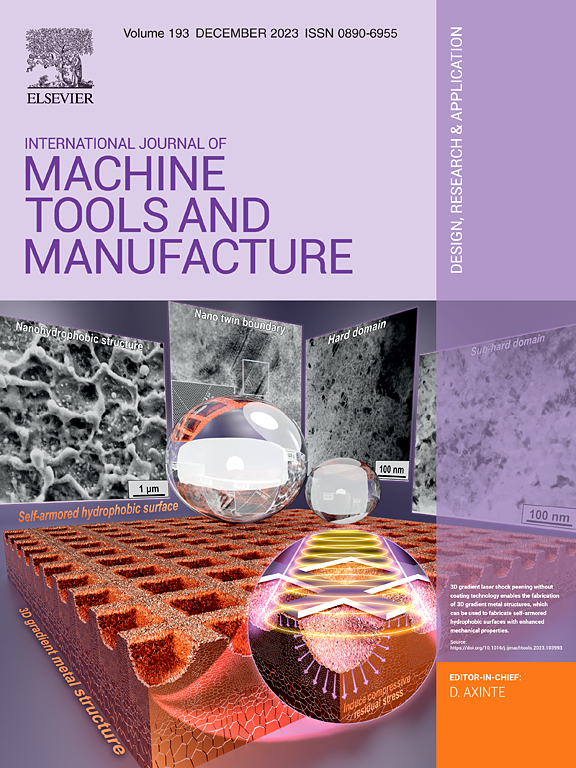A review of robust thermal error reduction of machine tools
IF 18.8
1区 工程技术
Q1 ENGINEERING, MANUFACTURING
International Journal of Machine Tools & Manufacture
Pub Date : 2025-06-01
DOI:10.1016/j.ijmachtools.2025.104298
引用次数: 0
Abstract
Thermal error reduction in machine tools has attracted increasing attention owing to its influence on the accuracy, productivity, and energy efficiency of machining processes. In several traditional studies, the thermal error has been modeled as a straightforward relationship between the heat input and the output machining error. However, the demand for thermal error reduction in complex practical conditions with the interactive variation of influencing factors has been increasing because energy saving and a predictive countermeasure for defects, even in transient conditions, are expected. Robust reduction in the thermal error under such complex conditions remains a challenging issue. This paper reviews the strategy and methodology for realizing robust thermal error reduction considering the variation in influencing factors. A comprehensive model of thermal error that considers the interaction of thermal and mechanical systems is described to provide an overview of the targeted topic. Specific methodologies published over the last 15 years, such as adaptive modeling and compensation, machine design optimization, and temperature control, are reviewed. We focus on the evolution of data-driven models and digital twin systems for thermal error compensation by describing their implementation frameworks. An open question regarding strategy selection for thermal error compensation considering uncertainty is discussed. This review reveals the current research gap and provides an outlook for future challenges in realizing real-time and adaptive thermal error compensation.

机床热误差鲁棒减小研究进展
机床热误差的减小由于其对加工过程的精度、生产率和能源效率的影响而受到越来越多的关注。在一些传统的研究中,热误差被建模为热输入和输出加工误差之间的直接关系。然而,在影响因素相互作用变化的复杂实际条件下,由于期望节能和对缺陷的预测对策,即使在瞬态条件下,对热误差减小的需求也在增加。在如此复杂的条件下,如何有效地减小热误差仍然是一个具有挑战性的问题。本文综述了考虑影响因素变化而实现鲁棒热误差减小的策略和方法。考虑到热和机械系统的相互作用的热误差的综合模型被描述为提供目标主题的概述。回顾了过去15年来发表的具体方法,如自适应建模和补偿,机器设计优化和温度控制。我们通过描述其实现框架,重点关注热误差补偿的数据驱动模型和数字孪生系统的发展。讨论了考虑不确定性的热误差补偿策略选择问题。本文综述了目前的研究差距,并对实现实时和自适应热误差补偿的未来挑战进行了展望。
本文章由计算机程序翻译,如有差异,请以英文原文为准。
求助全文
约1分钟内获得全文
求助全文
来源期刊
CiteScore
25.70
自引率
10.00%
发文量
66
审稿时长
18 days
期刊介绍:
The International Journal of Machine Tools and Manufacture is dedicated to advancing scientific comprehension of the fundamental mechanics involved in processes and machines utilized in the manufacturing of engineering components. While the primary focus is on metals, the journal also explores applications in composites, ceramics, and other structural or functional materials. The coverage includes a diverse range of topics:
- Essential mechanics of processes involving material removal, accretion, and deformation, encompassing solid, semi-solid, or particulate forms.
- Significant scientific advancements in existing or new processes and machines.
- In-depth characterization of workpiece materials (structure/surfaces) through advanced techniques (e.g., SEM, EDS, TEM, EBSD, AES, Raman spectroscopy) to unveil new phenomenological aspects governing manufacturing processes.
- Tool design, utilization, and comprehensive studies of failure mechanisms.
- Innovative concepts of machine tools, fixtures, and tool holders supported by modeling and demonstrations relevant to manufacturing processes within the journal's scope.
- Novel scientific contributions exploring interactions between the machine tool, control system, software design, and processes.
- Studies elucidating specific mechanisms governing niche processes (e.g., ultra-high precision, nano/atomic level manufacturing with either mechanical or non-mechanical "tools").
- Innovative approaches, underpinned by thorough scientific analysis, addressing emerging or breakthrough processes (e.g., bio-inspired manufacturing) and/or applications (e.g., ultra-high precision optics).

 求助内容:
求助内容: 应助结果提醒方式:
应助结果提醒方式:


